Centralize, Optimize, Transform:
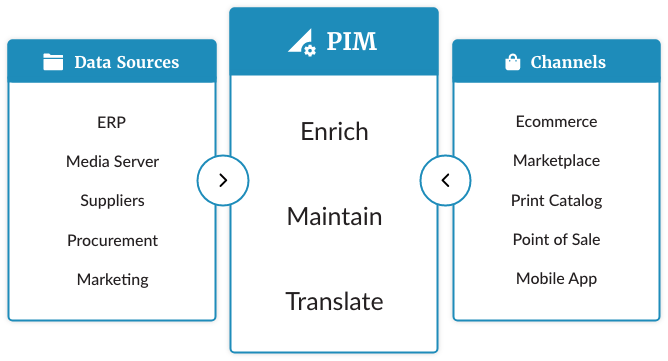
In today’s interconnected world, consumers expect a seamless shopping experience across various channels including in-store, online, through mobile apps, social media, etc. Omnichannel retailing satisfies this expectation, and a Product Information Management (PIM) system plays a pivotal role in making multi-channel selling efficient and profitable.
A product information system centralizes, manages, and enhances product information across various channels, ensuring consistency and standardization. From basic online shopping to offering memorable consumer experiences, a PIM is the cornerstone of modern eCommerce, projected to reach a market value of over $24 billion by 2027 with compound annual growth of 14% (from PIM Market article). Discover how a PIM can be the key to scaling and transforming your business.
A PIM system is a comprehensive solution that centralizes and organizes a wide array of product data. From detailed product descriptions, titles, SKUs, prices, weight, dimensions, to colors, sizes, and other attributes, a PIM ensures that every piece of information is meticulously managed. It also streamlines storing of visual elements such as images, animations, videos, and documents such as technical specifications and materials.
A product information system allows the inventory manager to create product categories and attributes to organize data in any fashion.
that Inventory tracking across different warehouses or stores is updated in real-time, and products are organized into categories with attributes and tags. For businesses reaching out to international customers, a PIM’s ability to manage information in multiple languages is invaluable.
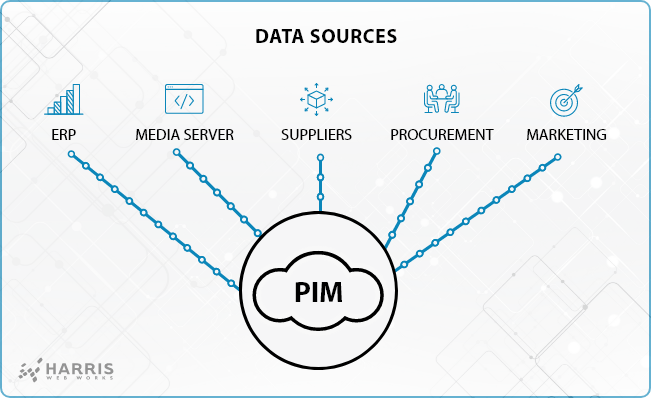
The implementation of a PIM brings multiple advantages that transform the way a business operates. By centralizing data, a product information system puts an end to scattered information, allowing for easier updates and synchronization. This centralization not only improves data quality by minimizing errors but also enhances credibility and customer confidence. A PIM’s scalability allows businesses to adapt to different languages and currencies, making international expansion seamless.
Empowering sales and marketing teams with better visibility and control over their content separates them from operations, allowing for more targeted and effective selling strategies. Time-saving automation minimizes effort and makes workflows more efficient, while optimization of user experience leads to increased conversion rates, more loyalty, and fewer complaints and returns. In essence, a PIM is a catalyst for business growth, efficiency, and customer satisfaction.
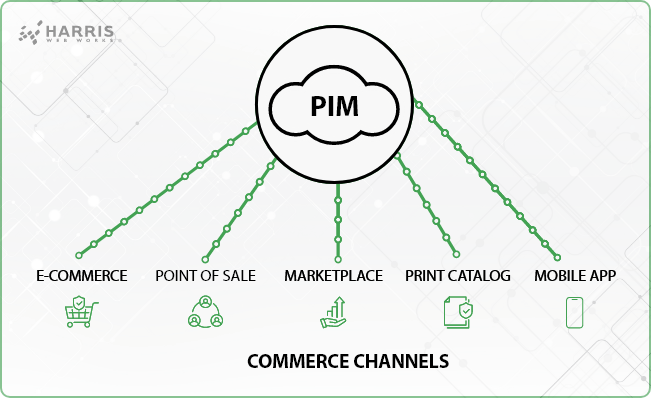
PIM systems are equipped with cutting-edge features that make them indispensable in the modern eCommerce landscape. The integration platform ensures a seamless connection with existing systems, acting as a central hub for product data. Data modeling capabilities allow for the normalization and conversion of data, making it adaptable to various needs. Advanced tools such as merchandising, search tools, bulk editing, advanced pricing rules, multi-language & multi-currency support,and secure data backups provide flexibility and control. In addition, some PIMs come with a built-in digital asset management (DAM) feature, which can help ensure consistent branding and efficient organization of ancillary images, videos, and documents. These features collectively make a product information system a robust and versatile tool for businesses of all sizes.
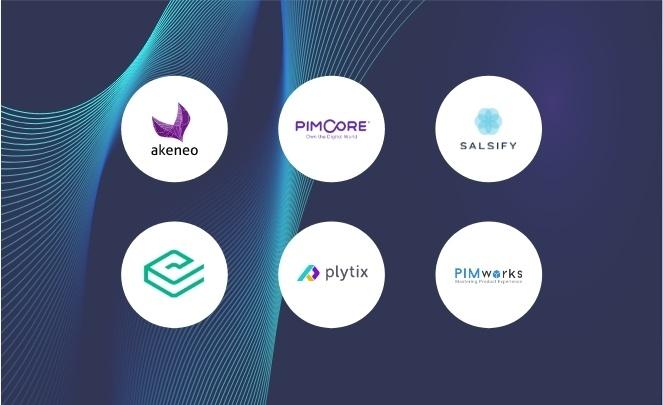
Choosing the right time to implement a PIM is crucial for leveraging its full potential. A PIM becomes essential when a business is expanding their ecommerce presence. Integration with various sales channels, including a company website, marketplaces and social media, is streamlined with a PIM, making it a go-to solution for multi-channel retailers. PIMs are optimized to manage a large inventory that may contain simple and highly-configurable products.
If moving product data from one platform to another is needed (i.e., changing ecommerce systems), a PIM simplifies migration data and makes the transition seamless. In today’s digitized world, a product information system is a vital tool for businesses aiming to outpace competitors.
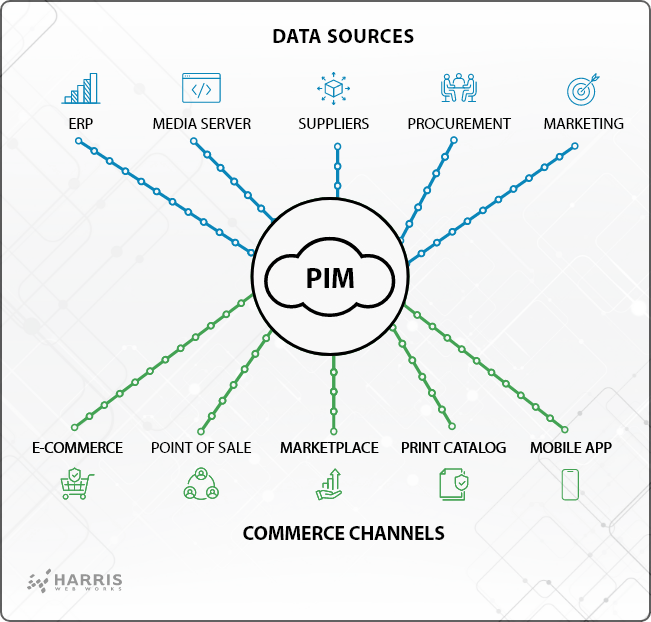
The major PIMs offer similar core capabilities plus distinct features that businesses should evaluate to determine which best suits their needs. See comparison table below followed by a summary of each PIM’s features.
| Vendor | Sales Layer | Akeneo | Pimcore | Salsify | Plytix | PIMworks | Casty |
|---|---|---|---|---|---|---|---|
| Platform | Sales Layer | Akeneo PIM | Pimcore Cloud Edition | Salsify | Plytix PIM | PIMworks | Casty PIM & DAM |
| Built-In 3rd Party Integrations | Yes | Yes | Yes | Yes | Yes | Yes | Yes |
| App Store | No | Yes | No | Limited | No | No | No |
| Developer-Friendly API | Yes | Yes | Yes | Yes | Yes | No | Yes |
| DAM Incorporated | Yes | No | Yes | No | Yes | Yes | Yes |
| Data Enhancement Tools Generated by AI | Yes | Third Party | N/A | Third Party | Yes | Yes | N/A |
| Multi-Language Tools | Yes | Yes | Yes | No | Yes | N/A | Yes |
| Main Market Segment (per G2.com) | Mid-Market/ Enterprise | Mid-Market/ Enterprise | Mid-Market/ Small Business | Mid-Market/ Enterprise | Small Business/ Mid-Market | Mid-Market/ Small Business | Mid-Market/ Small Business |

Sales Layer, a leading company in the Product Information Management (PIM) market, offers an efficient and streamlined platform for managing product information for small and mid-sized businesses. With its robust built-in third-party integration, businesses can eliminate the need for multiple product datasets. The platform is developer-friendly and comes with comprehensive product analytics tools, allowing businesses to launch products four times faster and effectively manage large inventories.
One standout feature of Sales Layer is its Digital Asset Management system (DAM) which centralizes product images, videos, and other assets. This integration enhances the user experience and optimizes the distribution of product information across various channels.
To cater to its diverse global customer base, Sales Layer also provides multi-language tools and seamless integration with e-commerce giants like Magento, BigCommerce, Shopify, and WooCommerce, as well as other popular sales channels such as Amazon and Walmart. It has received high praise as the most user-friendly PIM solution by G2.com reviews and rankings, making it an indispensable tool for improving efficiency in e-commerce operations.

Akeneo PIM is a market leader, known for its dynamic and innovative solutions. Designed for mid-market and enterprise-level businesses, Akeneo PIM centralizes and harmonizes marketing and technical data, resulting in superior product listings across various channels. Their focus on Product Experience (PX) strategy and Product Experience Management (PXM) practices ensures enhanced productivity and efficiency in handling product data.
Two standout features—Validation Workflow and the Teamwork Assistant—simplify data management within the Akeneo platform.
With seamless third-party integrations and a developer-friendly API, customization becomes effortless. Additionally, its robust App Store and multilingual tools expand the capabilities of Akeneo PIM, catering to diverse business requirements and a wide consumer base. All of these features and positive customer experiences has vaulted Akeneo to the top tier of the PIM industry.

Salsify is a well-respected player in the PIM industry, catering specifically to mid-market and enterprise businesses. What sets Salsify apart is its ability to seamlessly integrate with other critical platforms, its adaptability to serve dozens of industries, and its consumer-centric design.
Going beyond the traditional limits of PIM, Salsify incorporates a Product Experience Management (PXM) system that allows manufacturers, distributors, and retailers to create captivating product experiences. These experiences can be tailored to specific channels and emerging buying patterns, showcasing Salsify’s commitment to staying adaptable.
Salsify’s focus isn’t solely on maintaining data accuracy; it also centers around improving efficiency and getting ahead on the digital shelf. Through its cloud-based solution, products can be easily customized and distributed to boost sales. While there may not be an integrated DAM solution, Salsify compensates with its robust data enhancement tool that taps into third-party resources for enriching product data.
What makes Salsify truly stand out is not only its developer-friendly API but also its comprehensive range of product data features. With integrations already in place for e-commerce giants like BigCommerce, Magento, Shopify, and Salesforce Commerce Cloud and leading digital marketplaces, Salsify has positioned itself as a top platform for digital sales expansion.

Pimcore is an industry leader in the Product Information Management (PIM) market, known for its flexibility in catering to small businesses and mid-market enterprises with customized solutions. Its API-driven architecture allows for seamless integration of various tools necessary for different businesses, showcasing its exceptional integration capabilities.
While it may not offer native connectors for BigCommerce or Magento, Pimcore provides a developer-friendly API that enables businesses to customize the system according to their unique business requirements. Their workflow management system enhances accuracy and productivity, making Pimcore a reliable, efficient, and adaptable choice for PIM needs.

PIMworks is quickly becoming a prominent player in the PIM industry, with a focus on serving mid-market and small businesses. It offers comprehensive third-party integrations, which include major eCommerce platforms like Magento, Shopify, and WooCommerce, as well as popular sales channels such as Amazon, eBay, Walmart, and Wayfair. PIMworks provides accessible solutions for businesses of all sizes by facilitating seamless integration and multi-platform management.
It boasts an incorporated and robust Digital Asset Management (DAM) system that ensures centralized access to essential digital assets. Its AI-powered data enhancement tools minimize manual errors and significantly improve data quality.
By offering multi-language capabilities PIMworks serves a well-rounded experience for businesses worldwide.

Plytix is a prominent name in the PIM industry, specializing in providing practical solutions and efficiency-driven features for small and mid-market businesses. With strong third-party integrations and a developer-friendly API, Plytix ensures seamless collaboration within your business ecosystem. One of its standout offerings is the sleek Digital Asset Management (DAM) system, which offers end-to-end accessibility for product images, documents, videos, and other digital assets. Additionally, Plytix incorporates AI-enhanced data tools to deliver enriched product data.
To enhance its value proposition even further, Plytix offers brand portals and customizable product feeds that automatically populate with accurate and up-to-date product data. This innovative feature sets a new standard of convenience in product sharing. The user-friendly interface of Plytix makes it accessible to businesses of all sizes while remaining affordable. Plytix prioritizes customer service excellence by providing personalized onboarding and dedicated post-sale support systems to ensure client success remains at the forefront.

Catsy is a leading player in the field of Product Information Management (PIM) and Digital Asset Management (DAM), specifically for mid-market and small businesses. Its unique offering combines comprehensive PIM and DAM solutions into one integrated package. Catsy provides customizable channel templates and a dedicated brand portal for DAM assets, creating a centralized digital hub for efficient content management. Additionally, its completeness scoring feature ensures high-quality product data across all channels, aligning with their goal of optimizing product visibility. While lacking an App Store, Catsy supports developers through a user-friendly API that allows system modifications based on organizational needs. Furthermore, their multi-language tool makes it an excellent choice for businesses with diverse global customer bases. Another advantage is its integration with major e-commerce platforms like Magento, BigCommerce, Shopify, as well as popular online marketplaces such as Amazon and Walmart. Boasting high rankings for ease-of-use on G2.com, Catsy has established itself as a trusted and effective solution in the PIM and DAM landscape.
Omnichannel retailing revolves around delivering a uniform and reliable customer experience at every touch-point. A PIM system is instrumental in ensuring product details are accurate, consistent, and updated across all platforms. Regardless of whether a customer is browsing on their phone, tablet, and/or computer and later makes a purchase in the store, or vice versa, the product information will be consistent. This can include real-time inventory monitoring across multiple platforms, letting customers know what is available and where.
A PIM aids in personalized marketing by enabling retailers to customize promotions and offers based on specific customer behavior across various platforms.
By streamlining product information, a PIM enables retailers to offer a comprehensive and reliable omnichannel experience adapted to the needs of the contemporary consumer. These capabilities promote trust and enhance the user experience, leading to repeat business.
Artificial Intelligence (AI) and Machine Learning (ML) are transforming the way businesses operate, and their integration with a PIM is no exception. AI and ML bring intelligence and automation to PIM systems, making them more efficient and responsive. An AI-powered PIM can automate data validation and enrichment, ensuring that product information is accurate plus rich and engaging. It can analyze customer behavior and preferences to personalize product recommendations, enhancing conversion rates. ML algorithms can predict trends and optimize inventory levels, reducing stockouts or overstock situations.
Integration with AI and ML opens up new possibilities for content creation. Natural Language Processing (NLP) can generate product descriptions or translate content into different languages. Image recognition can automatically tag and categorize images, streamlining digital asset management.
The combination of PIM with AI and ML creates a dynamic and intelligent system that adapts to changing market conditions and customer needs. It leverages data to make informed decisions, automates routine tasks, and delivers personalized experiences. In an increasingly competitive market, AI and ML integration with a PIM offers a strategic advantage that can set a business apart.
A PIM system allows all product data to be stored in one place that smoothly integrates with all selling channels. It serves as the “source of truth” for product data, ensuring consistency, accuracy, and efficiency, which translates to a better customer experience and improved business performance.
Harris Web Works provides website development, administration and hosting services for commerce and corporate businesses. We build complex B2C and B2B websites with ERP and third-party integrations, and partner with clients to achieve evolving goals. Specializing in Magento and WordPress platforms, our credentials include being a Magento Business Solutions Partner with Magento-certified developers and a certified Amazon hosting architect.